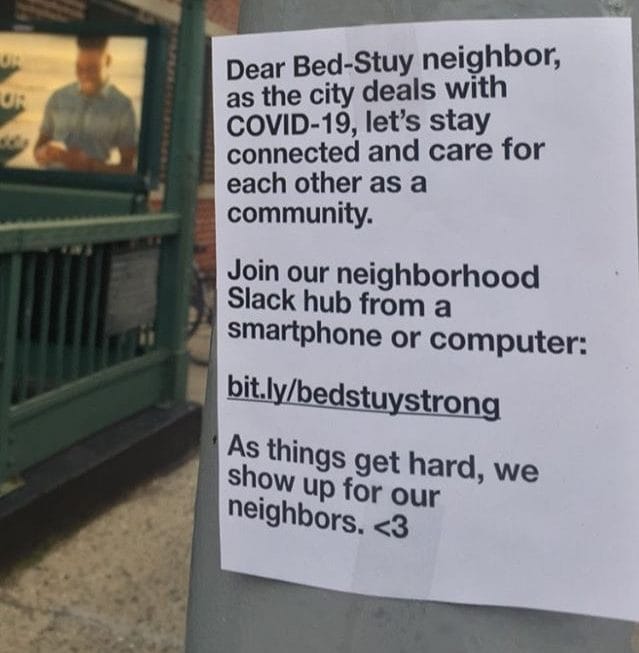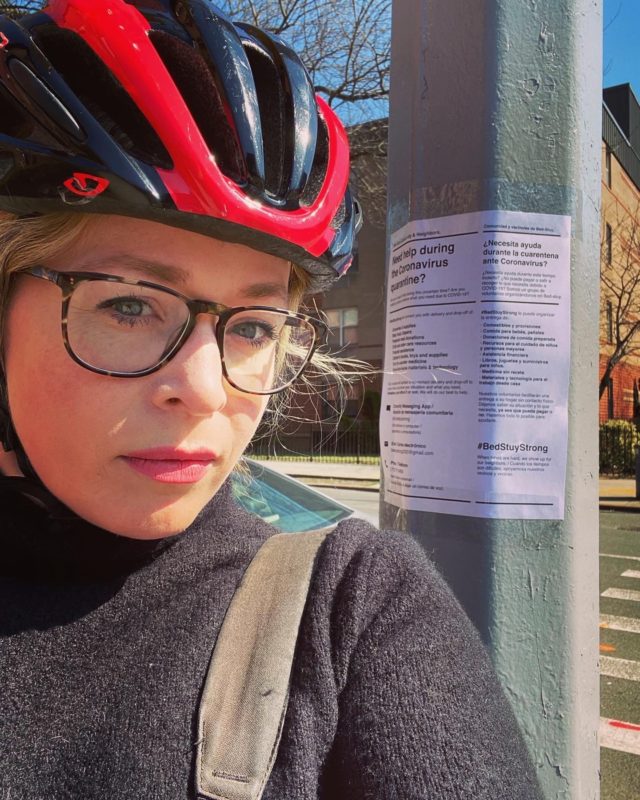#BedStuyStrong – A New Kind Of Mutual Support Community


Like much of the country, Brooklyn has had to react quickly to the coronavirus pandemic and the enormous strain it’s placed not only on our infrastructure but on our daily lives. Daily errands have become a safety risk, and we’ve been advised to stay put and to only leave our homes when necessary.
Parents whose jobs require their continued attendance, but whose children no longer spend their days at school, now need to find babysitters. Thousands of neighbors have found themselves unemployed overnight. A smattering of businesses and individuals have offered their own time and resources to help those in need, but the need continues to grow as the virus spreads throughout the city.
Nonprofit organizations and food pantries have begun delivering food to homebound clients and providing extra meals for periods of quarantine or self-isolation. But neighbors are also stepping up across the borough, creating virtual spaces where neighbors can offer, and request, resources, and services.
Sarah Thankam Mathews, a Bed-Stuy resident and fiction writer, saw a need for a space that was neighborhood-specific, and where anyone could freely join and participate. She first got involved with mutual aid when she was living in Washington D.C., where she and a group of friends set up a fund called the Grassroots Solidarity Fund for women and non-binary individuals who wanted to participate in the A Day Without a Woman strike in March 2017, but could not afford to take off work. The fund raised $5,000 in a single day.
When Mathews saw how dire the situation was becoming all over the world, she realized that commonly used tools and apps were perfect for connecting urban communities, particularly ones like Bed-Stuy.
“I was feeling this general sense of malaise at how unconnected many of us are in our urban neighborhoods, compared to how we used to live.” She also realized that there wasn’t much large-scale geographic organizing being done to help people struggling during the pandemic — though she has seen similar hubs pop up in places like Greenpoint.
With that in mind, Mathews chose Slack, a messaging platform commonly used in offices and other work environments, as the medium for a new mutual aid hub, #bedstuystrong. The hub officially launched on Saturday, and Mathews advertised primarily through flyers, which she and her partner posted around their Bed-Stuy neighborhood. As of yesterday, #bedstuystrong has roughly 1,300 members, and anyone in Bed-Stuy or the surrounding areas is free to join: just go to the hub link and enter your email address. You’ll receive a confirmation email containing the link to a page where you can create a username and password, after which you can immediately begin using the hub. You can access the hub online or by downloading the Slack app on your smartphone.

The hub consists of dozens of separate channels providing a wide range of resources, from the most recent coronavirus-related news and safety guidelines to recipes and cooking inspiration. In the “community needs,” channel, members post requests for pickup and delivery of groceries and household supplies, as well as links to volunteer services, fundraisers, and petitions.
While some members post their own requests, Mathews has also gathered a small group of volunteer admins, or administrators, who take shifts responding to a communal email address, bedstuystrong2020@gmail.com — and a Google Voice phone number, 732-771-9663. Through these channels, residents lacking a smart phone or computer are able to submit requests for help. Having this level of accessibility was crucial, Mathews said, especially since Bed-Stuy is home to a large number of low-income residents without smartphones or computers, as well as older adults and others who might not be especially tech-savvy.
Mathews had never done grassroots organizing on this level before, but she’s heartened by how swiftly the hub has grown. “It’s been really wild to see how successful this so far very decentralized, entirely dependent on altruism, model has been working.” While she hasn’t put a cap on the number of members able to join, she’s conscious of how the size of the group will affect member experience.
“It’s very warm and neighborly, and there is a sense of personal connection,” Mathews said. Too many members — say, 50,000 — might change that, she feels. She does, however, plan to work on creating a more sophisticated system as the hub grows — the current one is more of a placeholder, she said.
Mathews also created a model for anyone who wants to make a similar hub. The model includes guidelines for how to set geographic boundaries in Google Maps, how to create channels, and even for how to maintain a safe and comfortable space within the hub. Guidelines like “Foster Trust and Be Mindful of Bad Actors” and “Prioritize The Vulnerable” advise on how to keep personal information safe, how to extend access to people without smartphones or computers while respecting their privacy and dignity, and how to exercise kindness and respect to all members. “We each are responsible for the culture here,” one guideline stated. “If you are racist, sexist, classist, or homophobic, you will be banned with a quickness.”
Mutual aid is crucial during this time, Mathews believes.
“Mutual aid is solidarity,” she said. “It’s not charity, it’s not saviorism. It’s saving ourselves and taking care of each other. And I think we’re in this moment when we’re seeing the failure of so many institutions and so many systems, from our government’s safety nets to old-school philanthropy, in terms of meeting people’s needs.”
Anyone in or near Bed-Stuy is free to join #bedstuystrong, Mathews said.




